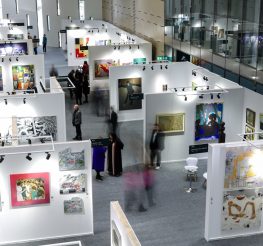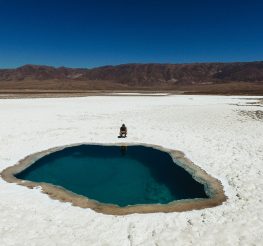Cairo to Libya: Egyptian Charity Convoys to Libya

Cairo 360
What compels five
Cairo friends to get into a car and drive straight into the Libyan revolution?
Cairo 360 finds out:
Egypt’s January 25th revolution seems to have had ripple effects on the entire Arab world,
especially in Libya, where news of a people’s uprising broke just days after
Egyptian former President Mubarak’s resignation. The video footage coming in from the Libyan
cities, where people were fighting Gadafi’s forces, compelled Adel
Abdel Ghafar, Ali Azmy, Mahmoud El Baroudi, Hassan El Toukhy and Tarek Shalaby to start collecting donations for medical aid to be sent to Libya.
‘The people in Libya
needed us more,’ 31-year-old Abdel Ghafar explained to
Cairo 360. Through reports coming out from Libya, they learned which medicine
supplies were needed, and started calling for donations through Facebook,
Twitter and SMSs to their friends. Within 48 hours, they had collected
approximately 45,000LE worth of medical aid.
Full of revolutionary fervour,
they decided to drive to the Libyan border,
where they had planned to drop the supplies off. Setting out in two cars from
Cairo on Thursday afternoon, February 24, the five friends – and British documentary
filmmaker Sara Sea, who came along and video-taped the trip – made it to
the Egyptian town of Salloum by 4AM.
Once there, they decided
to try their luck and see if they could drive into Libya, despite lacking the neccessary paperwork.
At the borders, they met a medical
convoy of the Arab Doctors Union heading into Libya. They joined the convoy and literally charmed their way across the border.
Into the War Zone
When they reached the
Eastern city of Tobruk, the whole medical convoy was given a hero’s welcome
whenever they were recognized as Egyptians. Suffice it to say there was a lot of hugging involved.
‘When I walked into a
shop to buy juice and water, the [shopkeeper] asked if I’m Egyptian and if I’m
with the convoy,’ said Abdel Ghafar. ‘When I said yes, he hugged me and said he
couldn’t take my money. For the next few days, it was the same thing everywhere
we went, with the hotels, the restaurants…’
Welcomed with open arms and
gratitude by the Libyan people, the emotional impact of their gesture began to
dawn on them.
‘We actually got
medicine that saved lives, even if it was in small
amounts,’ Abdel Ghafar said. ‘And
the fact that a group of Egyptians had travelled all the way into Libya to help
Libyans was a massive sign of solidarity for them.’
After a night in
Tobruk, they decided to drive eight hours onto the city of Benghazi. The city had just recently been liberated,
with carnage throughout the streets, shrapnel, the smell of shards in the air;
it was like a war zone, the scene of serious combat.
But the people of
Benghazi were fiercely triumphant, euphoric with their newfound freedom and
delighted at the medical convoy, which they greeted with a hail of gunfire in
the air. More hugging ensued.
After distributing
their medicine to several hospitals in Benghazi, the friends decided to tour
Benghazi, document the injuries and record eyewitness accounts. Shalaby took
photos for his blog, Sara Sea documented everything on video and all of the
friends tweeted throughout their trip. Tweeting live from inside of Libya
helped increase interest in their trip as well as their cause.
On the final day of their trip, they visited a recently liberated military barracks
outside of Benghazi, which contained Muammar
Gadafi’s local residence, underground tunnels and torture chambers. The compound’s walls carried the scribbled names of the martyrs who
had died a week before when trying to liberate the barracks. It was a
surreal experience to say the least.
While Abdel Ghafar notes that he did put
his own and his friends’ lives at risk for this trip, he believes it was
justified and for a good cause.
‘I needed to relieve
my conscious and to feel that I’ve done my bit [for Libya],’ he said.
Since
their return from Libya, the friends have managed to raise more funds and
supplies for the Arab Doctors Convoy and to spread awareness about the
Cairo-based initiative.
The Real Heroes
Abdel Ghafar insists that the risks they took were minor in comparison to
the members of the medical convoy that they had travelled with.
‘The real heroes are
the Egyptian volunteer doctors who have been there since we left them,’ he
said. Among the convoy were doctors,
nurses and medical and non-medical students, such as Abdel Khalek Sayed Abdel Khalek, a
nineteen-year-old student who had volunteered in Tahrir hospital during the
revolution and came to Libya to volunteer as well. Abdel Khalek was kidnapped by Gadafi forces
and made to appear on Libyan state TV in army uniform, where he confessed to be
a member of the pill-popping Al Qaeda forces in Libya. It’s been
two months since his disappearance, and Abdel Khalek’s family and friends are still
hoping for news of him. They have set up a Facebook Page and are working to get more media attention to his cause.
How You Can Help
Despite the lack of concrete numbers due to the Libyan regime’s crackdown on media, it is estimated that around 10,000 Libyans have died since February 17th, with thousands injured. The UN Security Council warned that the killings of Libyan civilians ‘could amount to crimes against humanity’. Muammar Gadafi is under investgation by the International Criminal Court for crimes against humanity.
The Arab Doctors
Convoy has been working diligently since the start of the Libyan uprising in collecting and sending twice-weekly convoys from Rabea
Adaweya Mosque in Nasr City. If you would like to donate, cash donations or medical supply
donations can be dropped off at the mosque, or you can make a donation to their
bank account number. For more information and for the contact numbers of the organizers,
click here.
recommended
 Arts & Culture
Arts & Culture
Art Cairo Returns to the Grand Egyptian Museum This January
Arab Art Art Cairo +8 City Life
City Life



